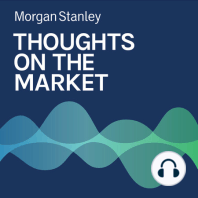4 min listen

Special Episode: Sanctions, Bonds and Currency Markets
Special Episode: Sanctions, Bonds and Currency Markets
ratings:
Length:
8 minutes
Released:
Mar 11, 2022
Format:
Podcast episode
Description
With multiple countries now imposing sanctions, investors in Russian government bonds and currencies will need to consider their options as the risk of default rises.Important note regarding economic sanctions. This research references country/ies which are generally the subject of comprehensive or selective sanctions programs administered or enforced by the U.S. Department of the Treasury’s Office of Foreign Assets Control (“OFAC”), the European Union and/or by other countries and multi-national bodies. Any references in this report to entities, debt or equity instruments, projects or persons that may be covered by such sanctions are strictly informational, and should not be read as recommending or advising as to any investment activities in relation to such entities, instruments or projects. Users of this report are solely responsible for ensuring that their investment activities in relation to any sanctioned country/ies are carried out in compliance with applicable sanctions.-----Transcript-----James Lord: Welcome to Thoughts on the Market. I'm James Lord, Head of FX and EM strategy. Simon Waever: And I'm Simon Waever, Global Head of Sovereign Credit Strategy. James Lord: And on this special episode of Thoughts on the Market, we'll be discussing the impact of recent sanctions on Russia for bonds and currency markets. It's Friday, March 11th at 1:00 p.m. in London. Simon Waever: and 8:00 a.m. in New York. James Lord: So, Simon, we've all been watching the recent events in Ukraine, which are truly tragic, and I think we've all been very saddened by everything that's happened. And it certainly feels a bit trite to be talking about the market implications of everything. But at the same time, there are huge economic and financial consequences from this invasion, and it has big implications for the whole world. So today, I think it would be great if we can provide a little bit of clarity on the impact for emerging markets. Simon, I want to start with Russia itself. The strong sanctions put in place have really had a big impact and increasing the likelihood that Russia could default on its debt. Can you walk us through where we stand on that debate and what the implications are? Simon Waever: That's right, it's had a huge impact already. So Russia's sovereign ratings have been downgraded all the way to Triple C and below, which is only just above default, and that's them having been investment grade just two weeks ago. If you look at the dollar denominated sovereign bonds, they're trading at around 20 cents on the dollar or below. But I think it all makes sense. The economic resilience needed to support an investment grade rating goes away when you remove a large part of the effect reserves, have sanctions on 80% of the banking sector, and with the economy likely to enter into a bigger recession, higher oil prices help, but just not enough. For now, the question is whether upcoming payments on the sovereign dollar bonds will be made. And I think it really comes down to two things. One, whether Russia wants to make the payments, so what we tend to call the willingness. And two whether US sanctions allow it, so the ability. Clarifications from the US Treasury suggests that beyond May 25th, payments cannot be made. So, either a missed payment happens on the first bond repayment after this, which is May 27th or Russia may also decide not to pay as soon as the next payment, which is on March 16th. And of course, the reason for Russia potentially not paying would be that they would want to conserve their foreign exchange. And actually, we've already had some issues on the local currency government bonds, so the ones denominated in Russian ruble. James, do you want to go over what those issues have been? James Lord: That's absolutely right. Already, foreigners do not appear to have received interest payments on their holdings of local currency government bonds. There was one due at the beginning of March, and it looks as though, although
Released:
Mar 11, 2022
Format:
Podcast episode
Titles in the series (100)
Andrew Sheets: A Second (and Third) Opinion for Equity Markets by Thoughts on the Market